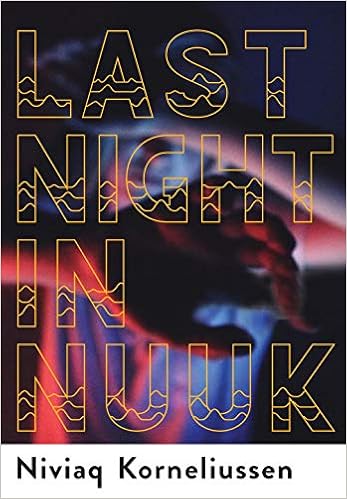 This is the first
novel I’ve ever read written by a Greenlander, so I was really looking forward
to it.
This is the first
novel I’ve ever read written by a Greenlander, so I was really looking forward
to it.
The main characters
are five young Greenlanders who live in Nuuk, the capital of Greenland. Fia; Inuk, Fia’s brother; Arnaq, Inuk’s best
friend and Fia’s temporary roommate; Sara, Fia’s love interest; and Ivik, Sara’s
partner, spend their nights engaging in partying and excessive drinking. Each of the five receives a chapter where we
learn about his/her struggles with gender and/or sexual identity.
The five young people
have much in common. Each experiences self-loathing,
shame, fear, confusion, and depression.
All feel very alone and engage in self-destructive behaviours. All yearn for love. Despite the prevalence of negative emotions,
hope is not entirely absent. The
suggestion seems to be that if people find their true identities and accept
themselves, they can transform and be reborn.
The hopefulness I
tended to find a bit too earnest. Were
there not some hope, this would be a very depressing novel, but the problem is that
some of the characters experience figurative bolts of lightning which transform
them. For example, one woman witnesses
the birth of her niece and her immediate, almost overpowering love for this
child and her innocence motivates a total change in outlook? Another character experiences love at first
sight and it brings about an epiphany?
I have not experienced
struggles of the type described in the book so had some difficulty identifying
with the characters and wondered about how realistically characters’ conflicts
were portrayed. For instance, one
character is in a lesbian relationship but a dislike of being touched sexually leads
to the conclusion that she is transgender.
Is this a realistic description of gender dysphoria? I imagine the novel would definitely appeal
to people from the LGBTQIA+ community.
This is a contemporary
novel and the narrative style reflects that.
Stream-of-consciousness, emails, text messages, hashtags, and social
media postings are used.
Stream-of-consciousness predominates; the problem is that the same chapter
will have sections that are very unstructured and other passages that are
grammatically structured. For instance,
Fia’s chapter begins with “Peter. One
man. Three years. Thousands of plans. Millions of dinner invitations. Vacuuming, dishwashing and cleaning, rushing
on forever towards infinity. False
smiles turning uglier. Dry kisses
stiffening like desiccated fish. Bad sex
should be avoided at all costs.” This is
an interior monologue style. This is
followed by properly punctuated dialogue.
Then there are pages that read like this: “steak, soda water and fruit, oh, did you remember
our membership card, back home in a stinking bus filled with people who smile
and greet you, iggu, baby, you’re ever so sweet, he says, my lips smile, my
brain’s about to explode; another part of my mind says stop smiling . . . ”. It would have been more logical to use a different
style for each character/chapter.
The setting is
primarily Nuuk, Greenland, but the events could in fact be taking place in any
small city anywhere. Nothing
differentiates the culture of Greenlander young people from that of young
people elsewhere in the world? This is
perhaps the author’s point, but I would have liked more sense of place.
Though the style is
not traditional, the book is not a difficult read. I can’t say that I disliked it, but it just
didn’t resonate with me. I would
recommend it to those interested in young queer culture.
Note: I received a digital galley from the publisher via NetGalley.
No comments:
Post a Comment